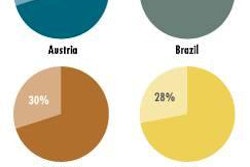"You can't compartmentalize sustainability anymore: everything is interrelated." So says Richard Edelman, CEO of his namesake public relations firm, as part of the "UN Global Compact-Accenture CEO Study on Sustainability 2013," conducted by the United Nations and Accenture (a management consultancy) on what 1,000 business leaders from 27 industries and 103 countries think about sustainability and its progress (or lack thereof) in business and society. While only one petfood-related business, Nestlé SA* (parent company of Nestlé Purina PetCare), was involved, the study's highlights should be of interest to companies and marketers in many industries, including petfood.
For example, Edelman's sentiments notwithstanding, most of the CEOs don't seem very positive on the state of sustainability in business today: only 38% say they can accurately quantify the value of their sustainability initiatives, according to the study. Further, only 32% believe the global economy is on track to meet the demands of a growing population and only 33% believe business is making sufficient effort to to tackling global sustainability challenges.
What may be more telling is shifts in CEOs' attitudes from 2010, the last time the study was conducted. (The 2013 edition is its third; the study was first done in 2007.) While 93% of CEOs this year believe sustainability is important to the future success of their businesses -- the same figure as in 2010 -- the percentage of CEOs who believe it is very important dropped from 54% in 2010 to 45% in 2013.
The report attributes the decline to "intensifying global challenges," including economic pressures, as well as frustration on the part of some CEOs at the slow pace of change and lack of governmental, regulatory, market and other types of support for that change. A full 83% believe government policymaking and regulation will be critical to progress -- an interesting data point considering that many business leaders tend to chafe at regulation and often contend that it hinders business.
Of more relevance to petfood, the study delved into differences among CEOs of varying industries. For the broad industry bucket that petfood falls into, consumer goods and services, 53% of CEOs view sustainability as very important. When asked about its importance to the future success of their businesses, the same amount (53%) say sustainability is important, down from 63% in 2010. That's quite a drop, mirrored in most other industries, which the report states is a "reflection of competing priorities, economic pressures and perhaps a growing skepticism in the potential impact of sustainability pressures on industry economics and measures of success."
And yet, looking outward, 80% of all the CEOs in the study view sustainability as a competitive advantage in their respective industries, and 81% believe the sustainability reputation of their companies is important in consumers' purchasing decisions. In fact, the information and data in the consumer section of the study is of most interest to our industry. To wit:
- 64% of CEOs see the consumer as a key stakeholder in influencing their approaches to sustainability -- the most important stakeholder, actually;
- But 46% believe sustainability will always be secondary to traditional factors of price, quality and availability;
- And only 28% say they have been able to get consumers to pay a price premium because of the company's sustainability reputation.
Perhaps that consumer ambivalence -- liking sustainability and a company and brand's support of it yet not being willing to pay more for it -- best explains the declines in CEOs attitudes toward sustainability, even more so than anything related to government policy or regulation. As with most things regarding business, market factors inevitably win out.
*I don't find the quote in the report from Paul Bulcke, CEO of Nestlé SA, particularly enlightening or meaningful, but considering that his company's petfood business comprises nearly a quarter of the global market, I'll share it here: "The role of every company is to be a positive force in society: you have to focus on creating value, creating success, and if you look from the perspective of the long-term then in going about your business, you should engage with society positively." It's a nice thought, at least.

















